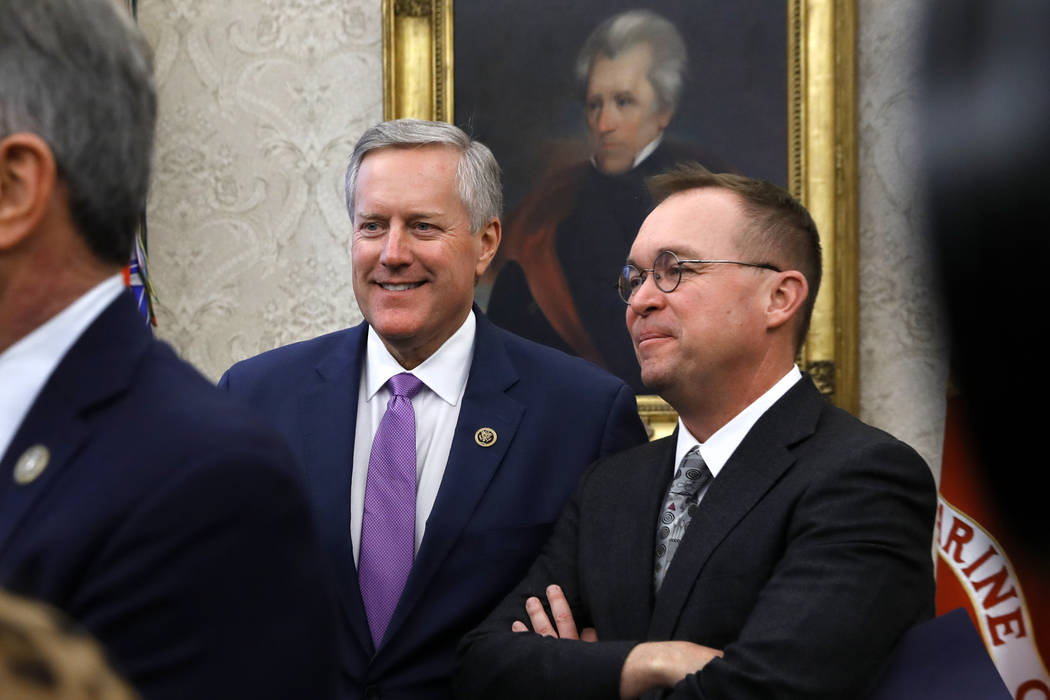Trump names OMB director Mick Mulvaney as acting chief of staff
WASHINGTON — President Donald Trump named Mick Mulvaney, director of the Office of Management and Budget, to be acting White House chief of staff late Friday.
The president, as is his wont, made the announcement via Twitter shortly after 5 p.m.
Mulvaney, a GOP House member from South Carolina when Trump took the oath of office in January 2017, quit his seat to become Trump’s OMB director. Since then, he has served as a utility player on the Trump team, also doubling as the acting director of the Consumer Financial Protection Bureau for more than a year.
The announcement replaced one drama in the Trump White House — Who will replace current chief of staff John Kelly? –with another – How long will Mulvaney last?
A senior administration official told reporters, “There’s no time limit. He’s the acting chief of staff, which means he’s the chief of staff. He got picked because the president likes him.”
As a former House member, the official added, Mulvaney can be expected to help the administration navigate Capitol Hill, where Democrats will control the House starting Jan. 3.
Issues with Priebus, Kelly
Kelly, took over in July 2017 after Trump’s very public dismissal of his first chief gatekeeper, Reince Priebus, also on Twitter.
Trump had come to believe that Priebus, who as chairman of the Republican National Committee was credited with helping Trump win the electoral college in 2016, aligned himself too much with the Washington establishment and too little with his disruptive commander-in-chief.
At first Kelly, a retired Marine Corps general whom Trump had picked as homeland security secretary, imposed order in Trump’s free-wheeling West Wing without seeming to try to keep Trump from being Trump.
But over time the president began to bristle at Kelly’s attempts to bring discipline into his orbit, and rumors began swirling that Trump would give Kelly the boot.
To quell those rumors, Kelly announced at a senior staff meeting in July that Trump had asked him to stay on at least through 2020 – and that Kelly had agreed. Speculation as to Kelly’s likely replacement did not cease.
On his way to Air Force One last Saturday, Trump told reporters on the South Lawn what many had guessed — that Kelly would be leaving “at the end of the year.”
It was the second time in two months that Trump announced that he was pushing out a Cabinet official without a permanent replacement.
The day after the midterm election, Attorney General Jeff Sessions submitted a letter of resignation to the president “at your request.” Trump announced on Twitter that Sessions’ chief of staff, Matthew Whitaker, would be the new “acting attorney general.”
Parade of candidates
Trump seemed prepared to hand the coveted chief of staff position to Nick Ayers, the young and well-regarded chief of staff for Vice President Mike Pence. But then Ayers announced on Twitter that he would be returning to Georgia, saying he had been planning on doing after two years of working for Pence.
According to reports, which Trump denied, the hire fell through because Ayers only wanted to fill the job temporarily while Trump wanted a permanent chief of staff.
Kathryn Dunn Tenpas, who has followed Trump administration turnover for the Brookings Institution, told the Review Journal the selection of Mulvaney as an acting chief of staff speaks to the difficulty the 45th president faces in hiring people for the second half of this term.
Given the parade of names floated in the news media in recent days– a roster that included Mulvaney, Whitaker, former New Jersey Gov. Chris Christie and Trump handler David Bossie – Trump should have found a permanent replacement for Kelly by now, she said.
It is always difficult for administrations to find top-notch staff in their second round of hires, said Tenpas.
“What’s different this time is people are seeing what’s happening to existing employees,” she said, adding that working in this West Wing is “a high-risk proposition for sure.”
In January 2012, Trump tweeted that one reason former President Barack Obama “can’t manage to pass his agenda” was the turnover that saw him go through three chiefs of staff in less than three years.
When Mulvaney takes the helm in January, Trump will face his third chief of staff in less than two years.
GOP strategist and CNN contributor Alice Stewart called Mulvaney “a good pick for the position. Clearly he’s been someone who has been able to step up to the plate for whatever the president has needed and has done a tremendous job.”
But Democratic strategist and CNN contributor Maria Cardona saw it differently.
“Clearly Trump is twisting his arm and Mulvaney is doing it out of a sense of obligation. That’s why he’s just ‘acting,’” she said.
In a statement Friday night, White House press secretary Sarah Sanders said, “Mick Mulvaney will not resign from the Office Of Management and Budget, but will spend all of his time devoted to his role as the acting chief of staff for the president. Russ Vought will handle day to day operations and run OMB.”
Contact Debra J. Saunders at dsaunders@reviewjournal.com or at 202-662-7391. Follow @DebraJSaunders on Twitter.























